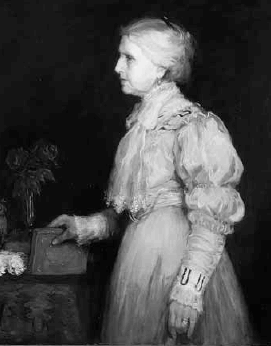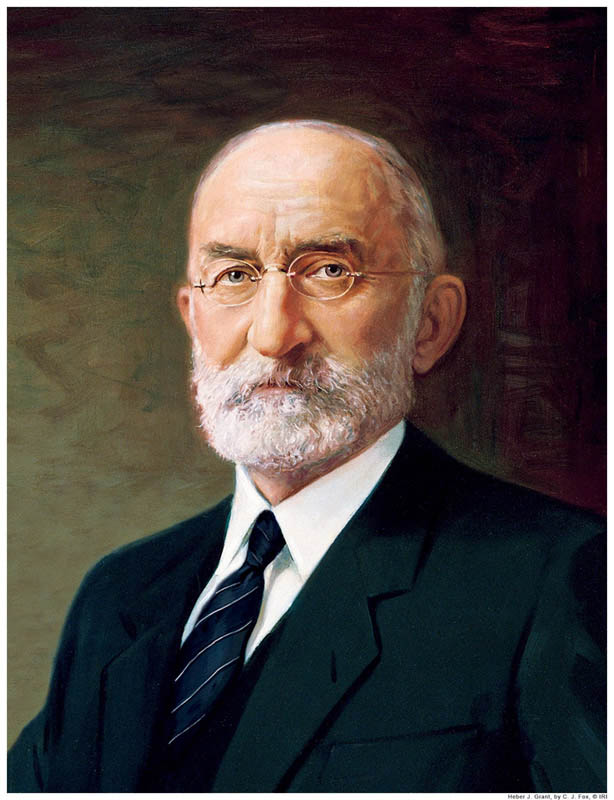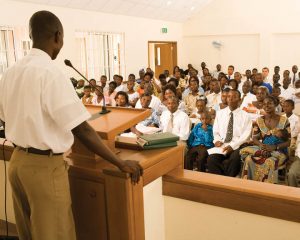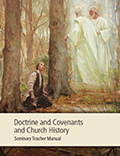90 years ago, on February 3, 1924, Woodrow Wilson died. He was the 28th president of the United States and, after the Republican Party split in 1912, he became a Democrat. Wilson’s presidency had several connections to Mormon history, some of which impacted the way the world viewed Mormonism.
Utah and Wilson’s Presidential Campaigns
Woodrow Wilson ran for president against William Howard Taft, the incumbent president. Mormon president Joseph F. Smith supported Taft, as he had during Taft’s previous political campaign. When his endorsement was represented as an instruction to church members on how to vote, he explained that this was a personal endorsement, not a church endorsement. The Church does not instruct its members concerning specific candidates. Church members accepted that explanation, and although Utah’s electoral vote went to Taft, the vote was very close, and the combined votes for Wilson and Roosevelt, who were also running, were greater than the votes for Taft. When Wilson ran for re-election in 1916, no church leaders or church-owned publications endorsed a candidate, and Utah voted for Wilson. Today, Mormon leaders do not endorse candidates, even privately, in order to avoid confusion.
Mormon General Authority Mentions of Woodrow Wilson
Wilson has been quoted at least twice in Mormon General Conference:
Woodrow Wilson stated: “A nation which does not remember what it was yesterday, does not know what it is today, nor what it is trying to do. We are trying to do a futile thing if we do not know where we came from or what we have been about (DHC, vol. 5, p. 286, quoted by Dennis B. Neuenschwander, in Bridges and Eternal Keepsakes, April 1999 General Conference).
Sterling W. Sill, an emeritus member of the First Quorum of the Seventy, quoted President Wilson in an article that appeared in the Mormon magazine for adults:
“The greatest ability of the American people is their ability to resist instruction,” (Woodrow Wilson, quoted by Sterling W. Sill, The Three I’s, Ensign, August 1979).
Woodrow Wilson and the Mormon Wheat
 In 1919, Woodrow Wilson came to Salt Lake City to speak at the Mormon Tabernacle. He was very ill and was forced to cancel all but two of his scheduled appointments. He gave his speech and then said he would keep only one other commitment—he wanted to meet Emmeline B. Wells. She was the international president of the Relief Society, the official auxiliary for Mormon women. He presented her with a commendation in recognition of the service Mormon women gave to their country during World War 1. The women of the Church raised and stored wheat for emergencies, and 200,000 bushels of that wheat were sold at a reasonable price to the United States government in its time of need during the war. In August, I will post an article telling more about this amazing story.
In 1919, Woodrow Wilson came to Salt Lake City to speak at the Mormon Tabernacle. He was very ill and was forced to cancel all but two of his scheduled appointments. He gave his speech and then said he would keep only one other commitment—he wanted to meet Emmeline B. Wells. She was the international president of the Relief Society, the official auxiliary for Mormon women. He presented her with a commendation in recognition of the service Mormon women gave to their country during World War 1. The women of the Church raised and stored wheat for emergencies, and 200,000 bushels of that wheat were sold at a reasonable price to the United States government in its time of need during the war. In August, I will post an article telling more about this amazing story.
The League of Nations Mormon Controversy
Utah played a significant role in trying to help Woodrow Wilson fulfill his desire to bring about permanent world peace following the end of the First World War. This role led to some challenging times for church members, but the results demonstrate how Christians can disagree on certain issues while still retaining a Christ-like love for one another.
Woodrow Wilson wanted the United States to join the League of Nations, a precursor to the current United Nations, that encouraged countries to come together to work out their problems peacefully. Utah senator Reed Smoot, along with many other Republicans, wanted amendments added that would ensure the United States did not lose its sovereignty. Many other Mormons opposed the League for various reasons. However, most Mormon leaders, including the prophet, supported and promoted it, seeing it as a way to help freedom of religion around the world. The Church did not take an official position on the matter, but individual church leaders did.
The Mountain Congress of the League to Enforce Peace held its annual conference in Salt Lake City in 1919. The conference was attended by William Taft, who was a previous United States president. The Mormon prophet, Heber J. Grant, who was a Democrat, not only attended the conference, but led several of the sessions. George F. Richards, Anthony W. Ivins, and B. H. Roberts also supported the League. President Ivins spoke publicly in support of the proposal and other church leaders encouraged or discouraged support while speaking at stake conferences, something that is also seldom done today. David O. McKay, Joseph Fielding Smith, Charles W. Nibley, and J. Reuben Clark were among those who openly opposed the League.
 Heber J. Grant read the manifesto in a stake (regional) conference in Salt Lake City in September, 1919. He explained that he had signed it because it matched his personal beliefs, not because he was commanding people to support it.
Heber J. Grant read the manifesto in a stake (regional) conference in Salt Lake City in September, 1919. He explained that he had signed it because it matched his personal beliefs, not because he was commanding people to support it.
The prophet said he regretted that church members were using the scriptures to bolster their views, a reference to Reed Smoot’s assertion that the Book of Mormon opposed the League of Nations and President Ivans’ claim that the Book of Mormon did support it.
An illustrated hand-bill has been circulated and has been widely republished in newspapers under the heading: “Mormon Bible Prophecies Become Issue in Opposition to the League of Nations.” The position of The Church of Jesus Christ of Latter-day Saints is that the standard works of the Church are not opposed to the League of Nations.
As stated in what I have read to you, I regret exceedingly that this great and important question has become a political issue, and I desire to ask each and all of the members of the Church, over which I have the honor to preside, that in all their controversy in connection with this great issue, they express themselves as to their views with due deference to the opinions of others.
END BLOCK QUOTE
(Please note that “Mormon Bible” is an incorrect title for the Book of Mormon, which is a companion to the Bible, not a replacement for it.)
Both sides had been able to find Book of Mormon scriptures to support their views. Those in opposition cited scriptures that said war would continue until the Second Coming and thus there was no use for the program. Others cited scriptures encouraging peace and discouraging the initiation of war without provocation. President Grant made it clear his support was based on his personal political views, not scripture, which did not mention a League of Nations. He fully supported political diversity, even among his own leaders, as long as they weren’t claiming scriptural authority for their beliefs.
It might seem curious to some that church leaders could disagree on something as important—politically—as the League of Nations, even while serving together as church leaders. The League of Nations was an idea some Mormons supported because they believed it would further God’s work, while others opposed it, possibly for the same reasons. However, there was never a revelation on the subject. Support for the League was not a commandment or an official declaration of belief. It was a personal interpretation for each leader concerning a matter that was important, but not the subject of revelation or official doctrine.
Mormons believe we are free to make our own decisions on any matter for which there is not an official church doctrine and we are to pray for personal confirmation of church doctrine, too. This applies even to the highest level of leadership. The church does not officially endorse candidates, but does endorse some political issues on a non-partisan basis. Today’s leaders are often more careful to make clear whether or not their support for a particular political issue is official or personal, particularly given the enhancements in communication. In earlier days, this was not always the case. The League of Nations debate was a perfect example of the ability of inspired people to see different paths to the same goal.
When the measure was defeated, there was dissension among some church members. President Grant expressed regret the following year that church members had ignored his plea for political civility on the subject. He taught by example that differences of opinion in political matters need not interfere with religious harmony. Over the course of his presidency, he would choose three strong opponents to the League of Nations as his counselors.
Woodrow Wilson Chooses First Mormon Cabinet Member
James Moyle was Woodrow Wilson’s Assistant Secretary of the Treasury from 1917 to 1921. He was the first Mormon to be appointed to a subcabinet position and a former Mormon prophet, Gordon B. Hinckley, wrote a biography of him.
Sources:
James B. Allen, Assistant Church Historian, The American Presidency and the Mormons, Ensign, October 1972
Church History In The Fulness Of Times Student Manual, Chapter Thirty-Eight: Change and Consistency
BOAP, Heber J. Grant, Conference Report, October 1919, Discourse of President Heber J. Grant, p.15-19
James B. Allen, A Note on Faith, Political Differences, and Mutual Respect, NauvooTimes.com
Allen, James B., and Glen M. Leonard. “Change and Continuity in the Postwar Decade, 1919-1930.” The story of the Latter-day Saints. Salt Lake City: Published in collaboration with the Historical Dept. of the Church of Jesus Christ of Latter-day Saints [by] Deseret Book Co., 1976. 512-513. Print.
About Terrie Lynn Bittner
The late Terrie Lynn Bittner—beloved wife, mother, grandmother, and friend—was the author of two homeschooling books and numerous articles, including several that appeared in Latter-day Saint magazines. She became a member of the Church at the age of 17 and began sharing her faith online in 1992.




